If you are a resident of Mexico or an about-to-be resident, is Assisted Living with nurse nuns an option to consider if you might need care?
The short answer, for some folks, may be yes.
How many residences in Mexico are Catholic non-profits and where are they located?
According to a 2018 report, INEGI (the National Institute of Statistics and Geography), there are under 900 assisted living communities in Mexico, 85% of which are in the private sector. The remaining 15% are Catholic non-profit residences, other non-profits, or DIF (Desarrollo Integral de la Familia, loosely translated as Integrated Development of the Family) government homes.
Residences are in every state and most large cities. For example, in Guadalajara, Mexico’s second largest city, there are approximately 35 assisted living homes. Of those 35, six are run by five different orders of nurse nuns, one order has two homes.
What may you expect under the care of nurse nuns?
The answer depends on the order of nuns, their mission, the location in Mexico, the resources of the home, how the home is supported by the Archdiocese, volunteer staff, the community, and more.
Historically nuns (and originally monks) were caregivers, nurses, purveyors of healing remedies as herbalists, and suppliers of prayers and psychological support for the ill. They met folks at homes, hospitals, and on the grounds of their wealthy benefactors first in Europe, then the Middle East (aiding crusaders), and later in Latin America beginning around 1540.
Some homes have inviting colonial entrances. Others are newer homes.

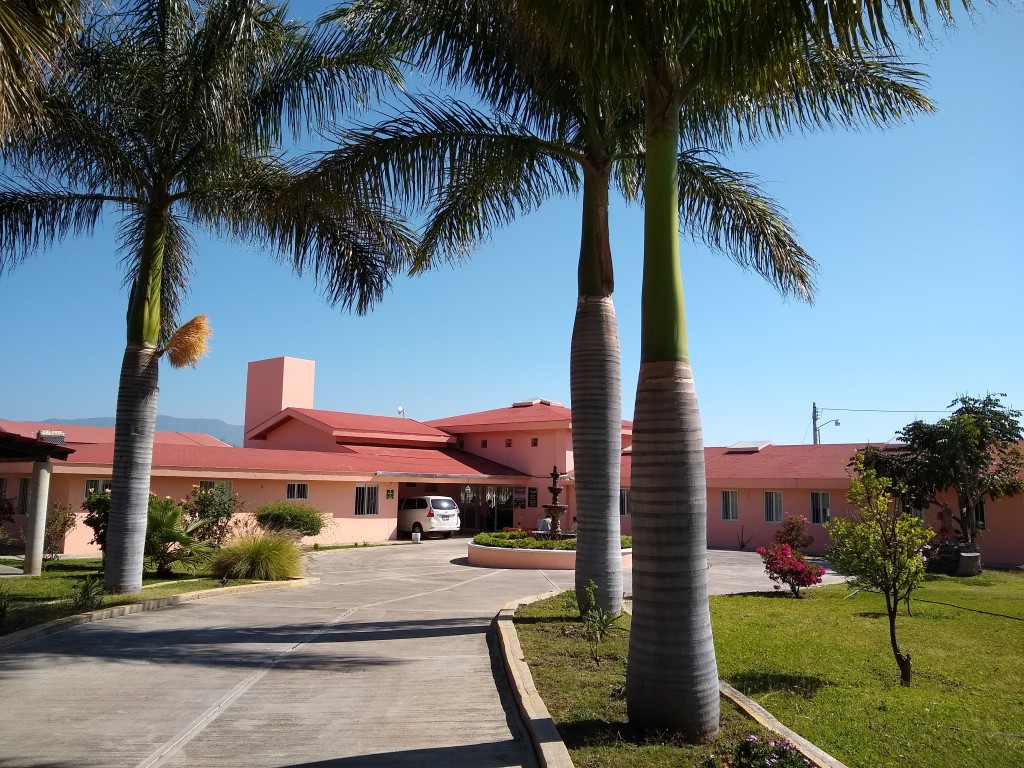
Ancianitas de Santa Clara de Asis, A.C was opened by Franciscan nuns in January of 2018 at San Pedro Tesistan, Jocotopec, Jalisco, Mexico. The order of St. Francis of Assisi first came to Mexico in 1955. They have a hospital in Guadalajara. Several expat volunteers at Lake Chapala invest time and love energy to support the home.
Homes tend to be clean and organized with immaculate kitchens, dining rooms, and laundry rooms. “Cleanliness is close to Godliness” seems to be a motto most nun administrators, usually known as “Madre Superiora”, and the Sisters “Hermanas” live by.

Asilo de los Desamparados, A.C. linen room, Guadalajara, Mexico
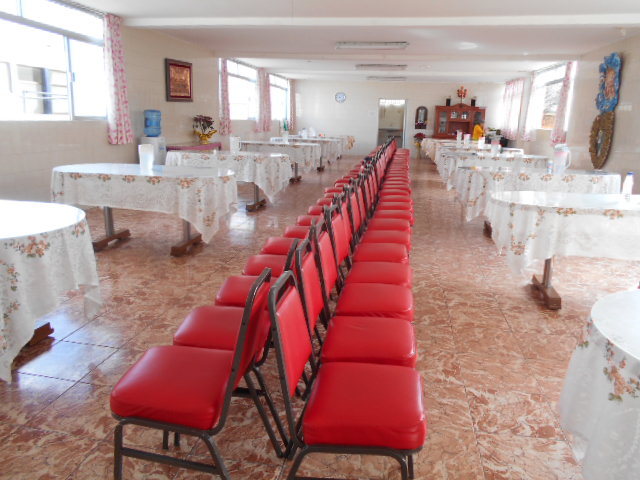


Food will invariably be Mexican, unlike continental cuisine found at some private pay homes with foreign residents.
Most homes are for women only, some are for men and women.
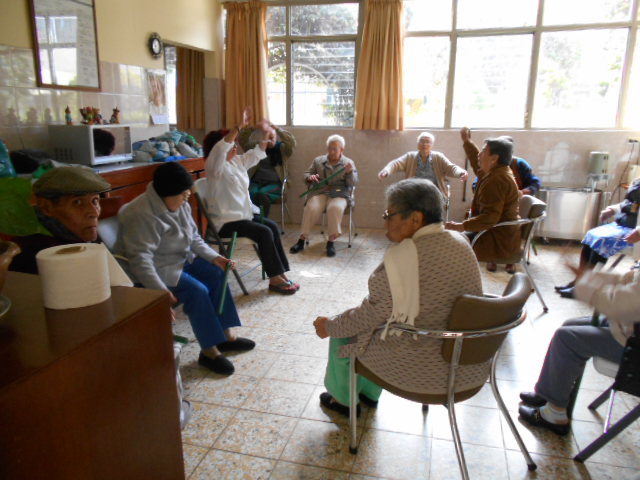
Environment is important. Properties with trees, gardens, places to stroll or sit in the sun or shade are common. Places for meditation and prayer are common, including of course a campus chapel.
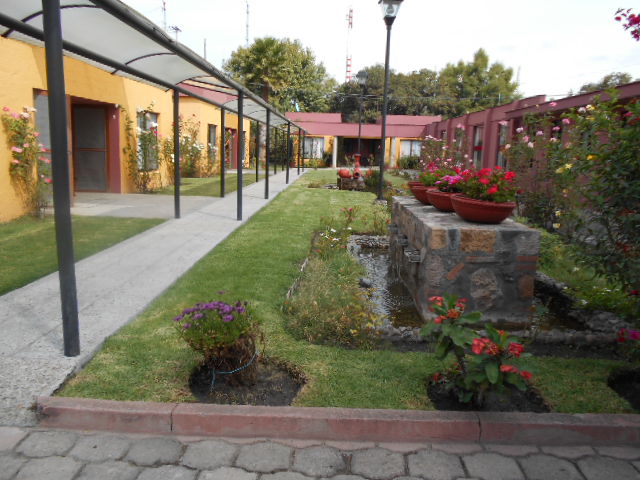
Casa Hogar San Vicente inner garden, Lagos de Moreno, Jalisco, Mexico
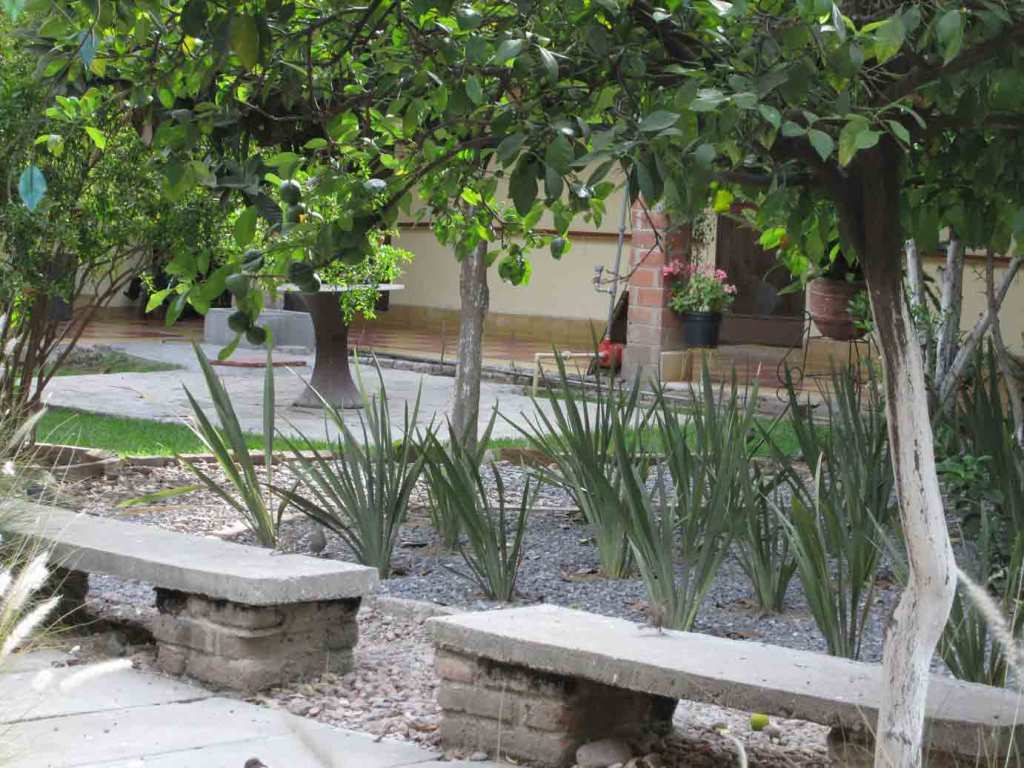
Casa Hogar Tepayac inner garden, Leon, Guanajuato, Mexico
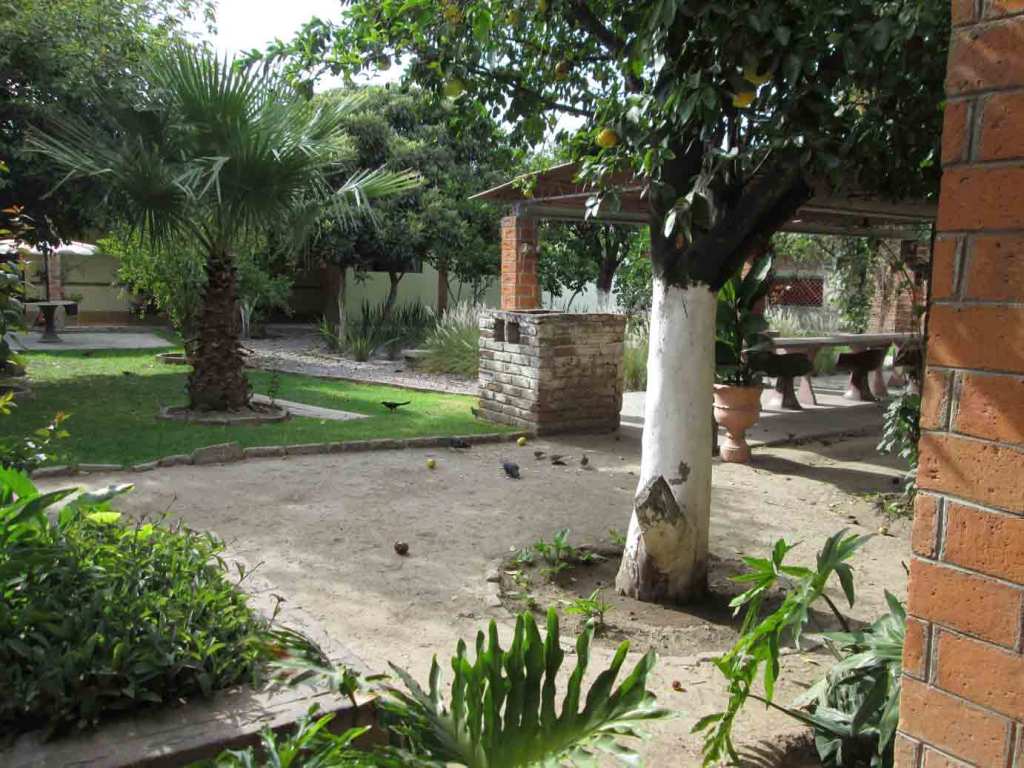
Casa Hogar Tepeyac inner garden, Leon, Guanajuato, Mexico
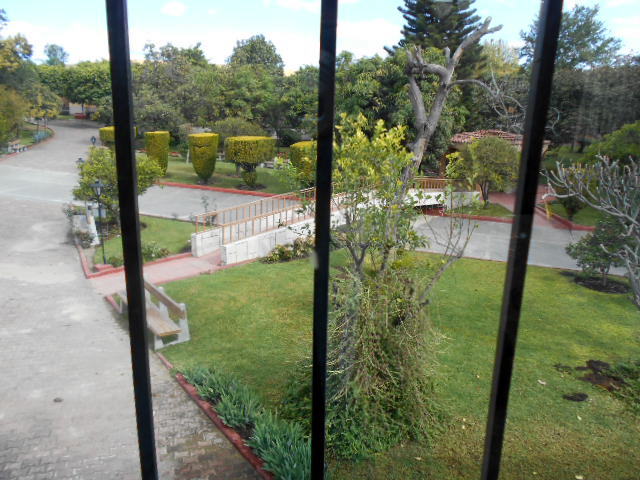
The language will usually be Spanish. Some nuns speak English. Nuns in Mexico are from Mexico but also from Africa, Europe, parts of Asia, and other countries in Latin America.
Quality of care. Mexicans in general are known for compassionate care, nurse nuns as well. Nuns have centuries of lived experience and tradition in the art of care. They are educated to serve vulnerable populations, especially older adults. They make sacrifices and overcome many challenges to help all. They show up daily and with attention. Since they have no children, patients are often offered their mothering ministrations. They pray for your healing even when not in front of you. If you believe in the power of prayer, their prayers may be welcome.
Nurse nuns have often worked in Catholic hospitals before working in assisted living and have backgrounds in acute/critical/emergency care.

Nuns tend to follow early morning rising rituals and do not stay up all night unless tending to residents. This day schedule, as opposed to the Mexican culture stay-up- all-night way of life, may be compatible with the routines of some foreigners.
Is it possible for an expat to live at a senior home run by nurse nuns?
If the person meets the admission requirements, yes. Americans, Brits, and Canadians have been or continue to be residents in assisted living run by Mexican nuns.
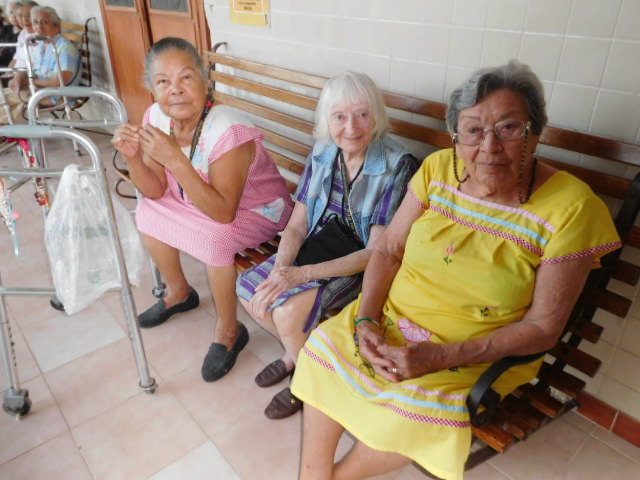
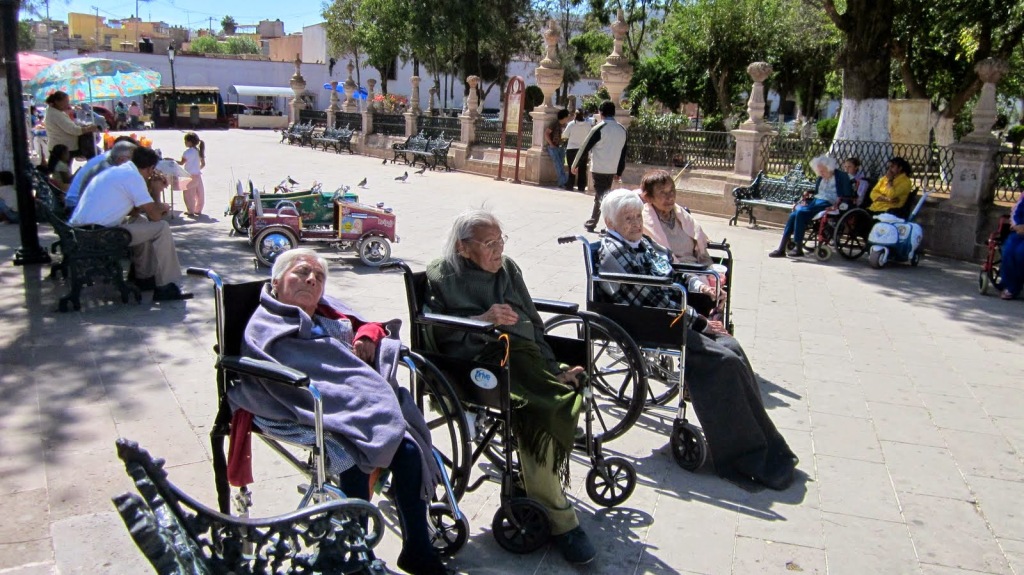
Precious residents of Asilo para Ancianas at the central plaza of Guadalupe, Zacatecas, Mexico. One of the residents is an American who shared she enjoys being under the care of the nuns.
For those who do not have enough funds for private pay, being cared for by nurse nuns at their “casas de reposos” (rest homes), is an option. Many Catholic orders are ecumenical, and open to non-Catholics and “all God’s children.” Pay is based on what each person can afford. The system tends to be democratic. Those with more funds are essentially supporting life for others. Those with more funds may often have their own private room. Those with fewer funds sleep and store belongings in a dormitory-like environment. In Mexican culture, being close to others and not being alone is preferred. Privacy is a Canadian, Western European, and U.S. concept.

Asilo de Desamparados, A.C., a women only home, sleeping quarters, Guadalajara, Mexico

Casa Hogar Tepeyac bedroom for ladies, Leon, Guanajuato, Mexico
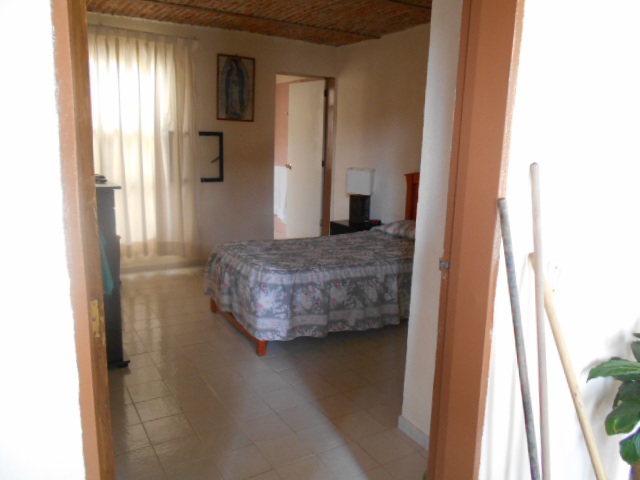
Casa Hogar San Vicente private room, Lagos de Moreno, Jalisco, Mexico. The home is supported by the community and a group of well-to-do volunteers.
The Missionaries of Charity (Mother Teresa) offer a small, immaculate, serene place in Tijuana, Baja Norte, Mexico. Some nuns are from India. On a visit the women residents were sewing. From the outside walls and entrance you would not know the nuns and their residents were there. Photos were not allowed, perhaps for security reasons.
What about the costs for assisted living and nursing? What do Mexicans pay, what do expats pay?
There is a sliding scale with nurse nuns and other non-profits. The prices in private pay are the same for everyone.
Most Mexicans cannot afford private pay. In this case families become caregivers, or their elders live with nuns or in other non-profit care homes.
Foreigners in Mexico (generally retirees) often have enough funds for private pay care which costs between $1500 and $3500 USD/month or more depending on the location and the amount of care needed, not including diapers, meds, or outside physicians. The costs with nuns would be lower depending on needs, around $800-$1000 USD (not always). Again, your payment to the residence is a donation that helps the entire community.
Note: care costs in all homes are currently climbing due to inflation in Mexico. The Canadian and U.S. dollar have decreased in value to the Mexican peso.
Will there continue to be homes administered by nurse nuns (and the Catholic Church) in Mexico in the foreseeable future?
Probably. Even though Catholic hospitals and assisted living homes are slowly being purchased and phased out by healthcare conglomerates in the U.S., it seems unlikely there will be a similar scenario in Mexico any time soon.
A 2015 report via ENPECYT (Survey of Public Perception of Science and Technology), an arm of INEGI, estimates 5% of 350,000 licensed nurses in Mexico are monjas (nuns), that would make the number about 17,500. Licensed nurses receive four years of training or more, including nurse nuns who study at their own schools and major universities. The nursing school curriculum includes practical, on-site education at hospitals, homes for older adults, and places where the population is poor and vulnerable. Many nuns have M.A. degrees in bioethics, nutrition, palliative care, and other disciplines. Even though Mexico is a country where few folks consider themselves practicing Catholics, the country is culturally Catholic, and traditions tend to be observed.
Summary:
Nurse nuns are dedicated and trained for the care of older adults as geriatric nurses. Other than contemplative orders, they also work in hospitals or as teachers.
Nuns have cared for vulnerable folks for centuries – the abandoned, the ill, travelers, wealthy patrons – in short, diverse populations.
If you love Mexican culture, are not particular about food, are comfortable with simplicity, and welcome the support of prayers and a unique kind of care, assisted living and nursing care with nuns may be an option. If you are not Catholic and do not speak a lot of Spanish, you may or may not feel comfortable.
© Wendy Jane Carrel, 2023
Wendy Jane Carrel, MA, is a Spanish-speaking senior care advocate from California. She has travelled 13 states of Mexico for more than 20 years researching health systems, senior care, and end-of-life care. She provides care solutions and guides transitions in/to Mexico for Americans, Canadians, and Europeans, and is a published author on subjects related to senior well-being. Wendy was a palliative care volunteer with a physician nun and nurse nuns of Santissima Trinidad in Jalisco, Mexico for three years and came to know Augustine, Carmelite, Dominican, Franciscan, Josefina, Sacred Heart nurses and the Little Sisters of the Abandoned Elderly, Missionaries of Charity (Mother Teresa), and the Sisters of Mary. See more at https://www.WellnessShepherd.com
Resources:
https://en.wikipedia.org/wiki/History_of_nursing
https://en.wikipedia.org/wiki/Category:Catholic_nursing_orders
https://en.wikipedia.org/wiki/History_of_the_Catholic_Church_in_Mexico
https://en.wikipedia.org/wiki/Catholic_sisters_and_nuns_in_the_United_States
https://desdelafe.mx/noticias/iglesia-en-el-mundo/conoce-a-las-santas-enfermeras-mexicanas/
https://en.www.inegi.org.mx/programas/enpecyt/2017/
https://www.ncregister.com/news/religious-sisters-offer-more-compassionate-care-to-the-elderly
http://www.scielo.org.co/scielo.php?script=sci_arttext&pid=S0121-08072016000400015
https://directorioempresarialmexico.com/empresa/0001642855/INSTITUTO-DE-BIENESTAR-MAURO-LOPEZ/ short list of Catholic assisted living homes in Mexico
Taking Care: The Story of Nursing and Its Power to Change Our World by Sarah de Gregorio (Harper, 2023)

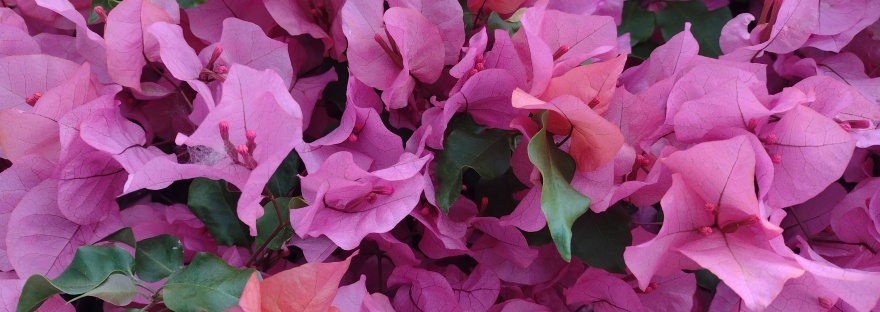
Yet another very informative and interesting post on Elder options in Mexico.
Ms Carrel, you are indeed an Angel among us, providing answers people need to know, but are sometimes leery asking about..
While some would rather put off thinking about end of life care, you put the facts out there for the better of all…
One can tell in your words, that you are truly a caring individual, wanting only the best for the aging population that choose Mexico as an option for living out their life…
God Bless you Ms Carrel, and many, many thanks for all you do…
Thank you Frank J for your kind and appreciative message. There are several low income “elder orphans” in Mexico barely surviving on social security, folks unable to pay for private assisted living in MX if ever in need. This is an option that may be surprisingly welcome for some. Abundant blessings to you and for all, and to your health, Wendy
That is a very impressive article. Thanks. I gave your name to two people this week. I hope they call you.
Hugs
Loretta Downs, MA, CSA Founder, Chrysalis End-of-Life Inspirations http://endoflifeinspirations.com http://endoflifeinspirations.com/ Advocate for the Gentle Exit and the Dignified Departure Facebook: https://www.facebook.com/ChrysalisEndOfLifeInspirations/ 773-343-8208 It’s your life story. Give it a good ending.
>
Thank you Loretta for taking the time to read about the dedication of the nuns (from my perspective), and for your endorsement. I feel so blessed the precious nuns opened their doors and hearts to me.
Thank you, Wendy, for this article on the nurse nuns in Mexico. It was both interesting and informative, with much pertinent information in a single condensed article. Being aware of your research and work in Ecuador, I knew the article would be well researched and highly professional. I also appreciated your clear and “calm” writing style. This article made me want to move to Mexico so that I may end my days, if necessary, with some nurse nuns in a Mexican home for the elderly (even though I’m not Catholic!).
Hello Doris, Thank you for your kind and appreciative note about my observations in the blog.. I too, did not grow up Catholic but have been taken by the dedication and sacrifices of nurse nuns. I feel so blessed that many have opened their doors and their hearts to me. May their presence continue.